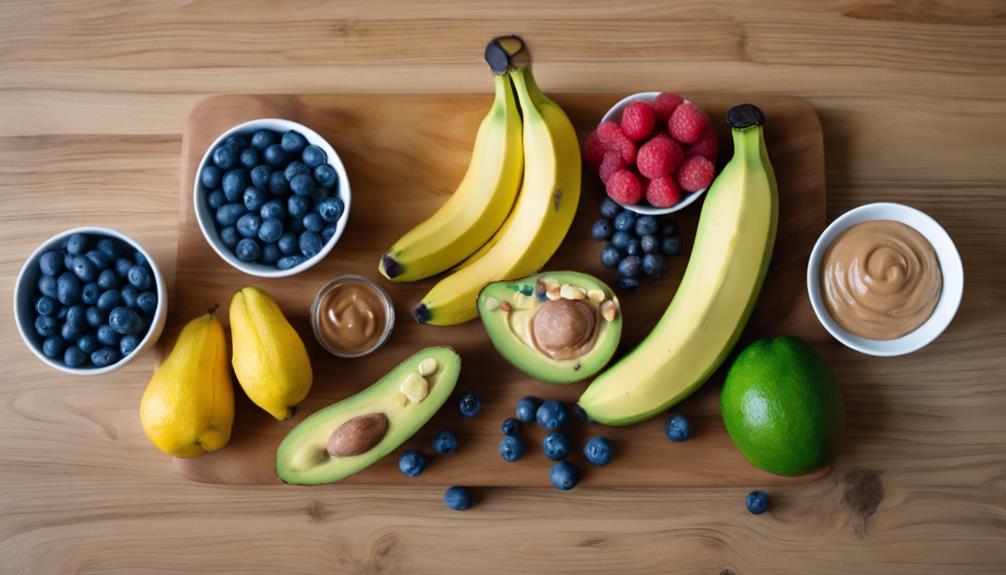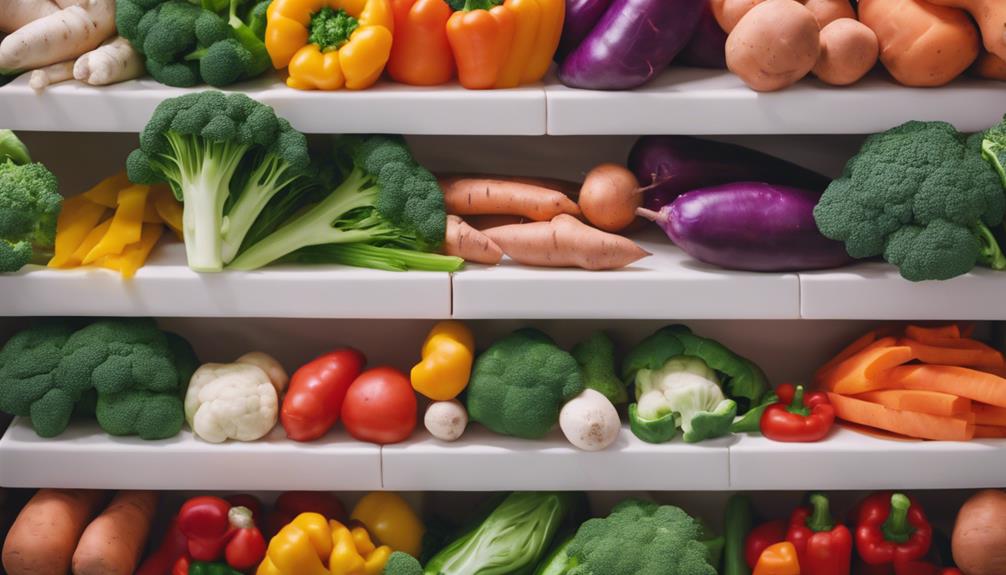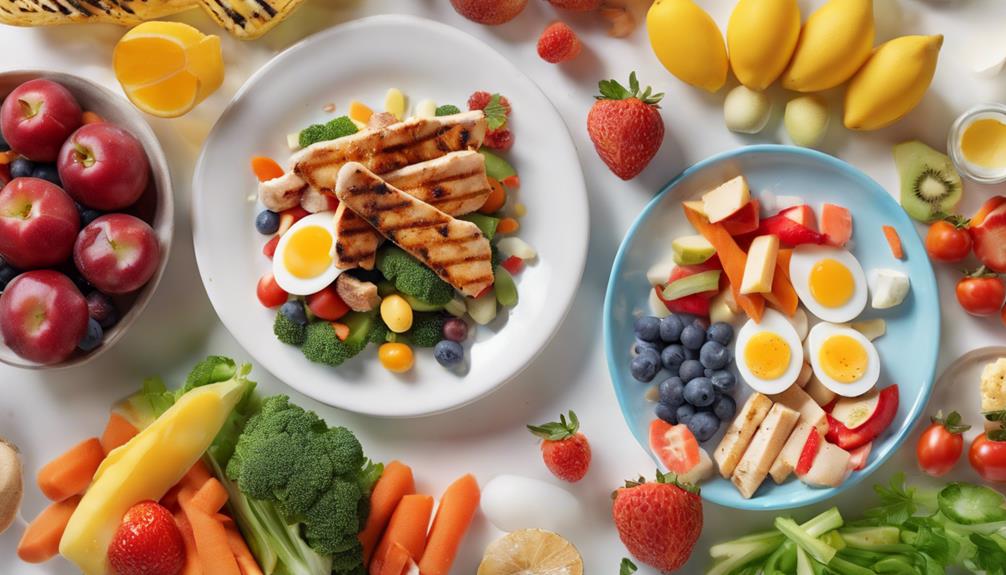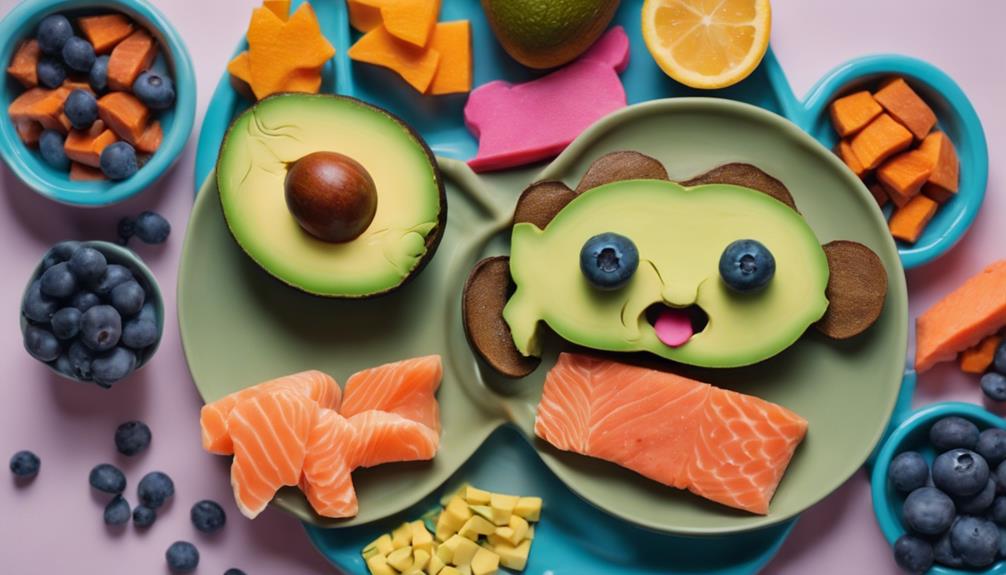Feed your 1-year-old nutrient-rich foods to promote brain development. Berries such as blueberries and strawberries are packed with antioxidants that help boost brainpower. Yogurt, rich in choline, helps fuel cognitive growth. Omega-3 loaded salmon can enhance brain function. Dairy products containing calcium support bone health. Whole grains like oats provide essential energy. Colorful vegetables like bell peppers and spinach are full of brain-boosting vitamins. Lean proteins such as chicken and fish deliver key nutrients. Choose nutrient-dense options that are rich in iron, zinc, and DHA. Variety is important for optimal brain fuel. Maximize brain growth and health with these delicious choices.
Key Takeaways
- Include brain-boosting berries, green vegetables, and antioxidants for brain protection and development.
- Offer yogurt rich in choline crucial for brain development and cognitive abilities in toddlers.
- Provide Omega-3 rich foods like salmon to support brain growth and cognitive abilities.
- Ensure a variety of lean proteins for essential amino acids and nutrients vital for brain health.
- Focus on nutrient-dense choices like iron, zinc, choline, and DHA from various foods for optimal brain development.
Brain-Boosting Berries
To boost your 1-year-old's brain development, consider incorporating a variety of antioxidant-rich berries into their meals and snacks. Berries like blueberries, strawberries, and grapes are packed with brain-boosting nutrients and antioxidants that play an essential role in protecting the brain from oxidative stress and damage. These antioxidants not only enhance brain function but also support cognitive development in toddlers.
By introducing berries into your baby's diet, you can provide essential nutrients necessary for excellent brain development during this critical stage. Whether served as a snack, mixed into yogurt, or added to oatmeal, berries are versatile and easy to include in various meals. Their sweet taste makes them a favorite among little ones, ensuring that your child receives the necessary brain-boosting benefits while enjoying their food.
Make the most of these nutrient-packed fruits to support healthy brain development in your 1-year-old, offering a delicious and beneficial addition to their daily meals.
Yogurt for Choline

Consider incorporating yogurt into your 1-year-old's diet as it's an important source of choline, an essential nutrient for brain development and memory function. Choline, found in yogurt, plays a significant role in neurotransmitter production, which supports cognitive abilities in toddlers.
By including yogurt in your child's meals, you can help in maintaining healthy brain anatomy and function. The choline present in yogurt also contributes to nerve cell communication and overall brain growth in babies.
Yogurt isn't only rich in choline but also a versatile and easy-to-eat food option for excellent brain development in 1-year-old babies. Making yogurt a regular part of your little one's diet can be a simple and effective way to make sure they're getting the necessary nutrients for their growing brain.
Omega-3 Rich Salmon
Salmon is a powerhouse of Omega-3 fatty acids, particularly DHA, important for your 1-year-old's brain growth and function.
When preparing salmon, opt for baking, broiling, or steaming to preserve these essential fats.
Including salmon in your little one's diet provides a wealth of nutrients essential for healthy brain development.
Brain Boosting Omega-3
Incorporate Omega-3 rich salmon into your 1-year-old's diet to enhance brain development and cognitive function. Salmon contains Omega-3 fatty acids, particularly DHA, which are essential for brain function. These healthy fats play a significant role in supporting brain growth and cognitive abilities in young children.
When preparing salmon for your little one, it's important to choose cooking methods like baking, broiling, or steaming to retain its nutritional benefits. Deep-frying salmon may destroy the Omega-3 fats it contains.
Salmon's Nutrient Benefits
Enhancing your 1-year-old's brain development can be achieved by introducing Omega-3 rich salmon into their diet. Salmon is a powerhouse of nutrients, especially Omega-3 fatty acids like DHA, important for brain growth and function.
These essential fatty acids, DHA in particular, play a significant role in supporting brain health and development in babies and toddlers. It's important to note that the Omega-3 fats in salmon are stable when consumed in whole foods, but methods like deep-frying may destroy them.
To retain its nutritional benefits, it's recommended to prepare salmon using methods such as baking, broiling, or steaming.
Easy Salmon Recipes
For a flavorful and nutritious meal that supports your 1-year-old's brain development, consider trying out these simple salmon recipes rich in omega-3 fatty acids.
Salmon, a fish rich in omega-3 fatty acids, particularly DHA, plays an important role in brain growth and function for 1-year-old babies. To preserve these essential nutrients, it's best to avoid deep-frying salmon as high heat can destroy omega-3 fats.
Best preparation methods like baking, broiling, or steaming help retain salmon's nutritional benefits, making it an excellent choice for your little one's diet.
Including salmon in your 1-year-old's meals can provide the necessary nutrients for healthy brain development. By introducing omega-3 rich salmon recipes early on, you can support cognitive growth and function in your baby.
Calcium From Dairy

Rich in calcium, dairy products like milk, cheese, and yogurt play an essential role in supporting bone and teeth development in 1-year-old babies. Calcium from dairy is crucial for bone health, ensuring strong and healthy bones as your little one grows.
Additionally, the presence of vitamin D in dairy products aids in the absorption and utilization of calcium, further enhancing bone development.
Here are some key points to take into account about calcium from dairy:
- Dairy products not only support bone health but also help in maintaining a healthy heart rhythm and muscle function in growing toddlers.
- Adequate calcium intake from dairy is necessary for supporting nerve function and blood clotting in 1-year-old babies.
- Including dairy in your 1-year-old's diet provides not only calcium but also essential nutrients like vitamin D, promoting overall growth and development.
Ensure your child's diet includes dairy products to support their bone development and overall health.
Whole Grain Goodness

Including whole grains in your 1-year-old's diet can greatly contribute to their brain development and overall health. Whole grains like oats provide essential carbohydrates, fiber, and B vitamins important for brain energy and function. These nutrient-rich grains can aid in improving auditory attention and memory cognition in your little one.
What's great is that cooking methods don't affect the carbohydrates and fiber content in whole grains, making them a nutritious choice for ideal brain development.
For instance, oatmeal porridge, made from oats, is a fantastic brain-boosting food that can be easily integrated into your 1-year-old's meals. Oats aren't only rich in nutrients but also offer fiber and protein, making them an excellent choice for supporting your child's brain development.
Fruity Nutrients

Incorporating a variety of fruits into your 1-year-old's diet is important for supporting their brain health and development. Here are some fruity nutrients that can benefit your little one:
- Berries, like blueberries, are packed with antioxidants such as vitamin C and phytonutrients, which play an important role in brain health and development.
- Kiwi is an excellent source of vitamin C, acting as an antioxidant to shield the brain from oxidative stress and promote overall brain function.
- Oranges are rich in vitamin C, essential for neurotransmitter synthesis and safeguarding brain cells, necessary for your 1-year-old's growing brain.
Including these fruits and vegetables in your child's meals can provide them with the necessary nutrients like vitamin C and antioxidants, supporting their brain development and overall health. Remember to offer a variety of colorful fruits to ensure your little one gets a range of essential nutrients for the best brain function.
Veggie Variety

Introducing a variety of colorful veggies is vital for your 1-year-old's brain development. Different veggies offer essential nutrients like antioxidants, vitamins, and minerals necessary for their cognitive function.
Get creative with cooking methods to make veggies more appealing and enjoyable for your little one.
Essential Veggie Nutrients
Leafy green vegetables like spinach and kale offer important antioxidants such as lutein and vitamin K, essential for 1-year-old baby brain development. Including these veggies in your child's diet can provide the necessary nutrients to support their growing brain.
Here are some key points to take into account:
- Antioxidants for Protection: Green vegetables are packed with antioxidants that safeguard your baby's brain cells from damage, ensuring ideal development.
- Vitamin K for Cognitive Function: The vitamin K present in leafy greens plays a significant role in enhancing cognitive function and memory retention in your little one.
- Diverse Nutrient Intake for Brain Health: By incorporating a variety of veggies like spinach, kale, and broccoli, you can make sure your 1-year-old receives a range of nutrients important for their brain health.
Colorful Veggie Options
To expand your 1-year-old's veggie options and enhance their brain development, consider adding a variety of colorful vegetables rich in essential vitamins and minerals. Colorful veggies like bell peppers, carrots, and tomatoes are packed with nutrients crucial for your little one's brain growth. Dark leafy greens such as spinach and kale provide antioxidants that protect the brain from oxidative stress. Sweet potatoes and squash offer vital nutrients like vitamin A and complex carbohydrates for sustained brain energy. Broccoli and cauliflower, high in fiber, vitamins, and minerals, support cognitive function and brain health in toddlers. Including a mix of these colorful vegetables in your child's meals can promote optimal brain development and overall health.
| Colorful Vegetables | Benefits |
|---|---|
| Bell Peppers | Rich in vitamins C, A |
| Carrots | High in beta-carotene |
| Tomatoes | Good source of lycopene |
| Spinach | Antioxidant powerhouse |
Cooking Veggie Creatively
Enhance your 1-year-old's brain development by creatively cooking a variety of colorful vegetables to provide essential nutrients and antioxidants.
When cooking veggies for your little one, consider the following:
- Mix and match: Combine different vegetables in purees or soups to introduce diverse flavors and textures, keeping mealtime exciting for your baby.
- Try various cooking methods: Experiment with steaming, roasting, or pureeing veggies to retain their nutritional value and appeal to your child's taste buds.
- Include a rainbow of vegetables: Incorporating a variety of colorful veggies like broccoli, spinach, carrots, and sweet potatoes ensures that your 1-year-old receives a wide range of vitamins, minerals, and antioxidants important for brain development.
Lean Protein Picks

Selecting lean protein sources like chicken, turkey, and lean cuts of beef is essential for supporting brain development in your 1-year-old baby. These lean protein options provide essential amino acids that aid in cognitive function, memory retention, and overall brain health.
Rich in nutrients like zinc, iron, and choline, lean protein choices play a pivotal role in ideal brain development for toddlers. Fish, eggs, and legumes are also excellent lean protein picks that offer necessary nutrients necessary for the growth and function of your 1-year-old's brain.
Nutrient-Dense Choices

When it comes to nutrient-dense choices for your 1-year-old's brain development, focusing on key brain nutrients like iron, zinc, choline, and DHA is essential.
Variety is key, so incorporating a range of foods such as lean meats, eggs, salmon, leafy greens, Greek yogurt, whole grain oatmeal, and colorful fruits like blueberries can provide a well-rounded nutrient profile for peak brain growth.
Homemade baby food using ingredients like nuts, seeds, dark green vegetables, and whole grains can offer a diverse array of brain-boosting nutrients to support your little one's healthy brain development.
Key Brain Nutrients
Support your 1-year-old's brain development by prioritizing key brain nutrients through nutrient-dense food choices. Remember to include foods rich in iron and zinc, essential for healthy brain anatomy and cognitive development. Choline is another vital nutrient to prioritize, aiding in memory and neurotransmitter production for ideal brain function.
Additionally, omega-3 fatty acids, such as DHA, play a significant role in supporting brain growth and function in 1-year-old babies. Ensuring your little one's diet includes these key brain nutrients can help lay a strong foundation for their cognitive development and overall brain health.
- Include iron and zinc-rich foods for healthy brain development.
- Prioritize choline for memory and neurotransmitter production.
- Incorporate omega-3 fatty acids, like DHA, for ideal brain growth and function.
Importance of Variety
To guarantee your 1-year-old receives essential brain-boosting nutrients, focus on offering a diverse range of nutrient-dense foods in their diet.
Including foods rich in iron, zinc, choline, and healthy fats can support ideal brain development in toddlers.
Introducing a variety of fruits, vegetables, lean meats, dairy, and whole grains can provide a well-rounded diet for brain health.
Encouraging diversity in food choices helps prevent nutrient deficiencies and supports cognitive function in 1-year-olds.
Opt for colorful fruits, dark green vegetables, whole grains, and lean proteins to offer a range of brain-boosting nutrients for your little one.
By incorporating nutrient-dense foods into your child's meals, you can ensure they're getting the essential vitamins and minerals important for their brain development.
Homemade Baby Food
Prepare nutrient-dense homemade baby food to optimize your 1-year-old's brain development with pureed meats, fortified cereals, fruits, vegetables, and beans.
When making homemade baby food, consider these essential nutrient-dense choices:
- First Foods: Introduce a variety of nutrient-rich foods as first foods to support your baby's brain development.
- Brain Foods: Incorporate foods rich in omega-3 fatty acids, iron, zinc, and vitamins to nourish your baby's growing brain.
- Whole Ingredients: Use whole ingredients to create homemade baby food, ensuring your child receives the maximum nutritional benefits from each meal.
Optimal Brain Development

For ideal brain development in a 1-year-old baby, focus on providing nutrient-dense foods rich in key nutrients like iron, zinc, choline, and healthy fats. Nutrient-dense foods such as salmon, eggs, lean meat, dairy, nuts, whole grains, beans, dark green vegetables, and colorful fruits are essential for supporting cognitive function and brain growth in toddlers. These foods provide the necessary nutrients important for optimal brain development.
Additionally, water intake plays an important role in maintaining brain function and concentration in 1-year-olds, so make sure adequate hydration. Including brain-boosting foods like avocado, Greek yogurt, blueberries, and lentils in your baby's diet can further enhance their brain development.
Frequently Asked Questions
How Can I Improve My Baby's Brain Development at 1 Year?
To boost your baby's brain development at 1 year, focus on introducing nutrient-dense foods like salmon and leafy greens. Including iron-rich options, colorful fruits, and whole grains can also aid cognitive function and provide essential nutrients for their growing brain.
How Can I Stimulate My 1 Year Olds Mind?
To stimulate your 1-year-old's mind, engage in interactive play, read colorful books, offer age-appropriate toys, sing songs, and create a safe, stimulating environment. These activities help develop cognitive, language, sensory, fine motor, auditory, and rhythm skills.
What Foods Help Brain Development?
To help your 1-year-old's brain development, include protein-rich foods like lean meat, eggs, and dairy in their diet. Omega-3 fatty acids from sources like salmon and nuts, iron-rich foods such as lentils, and leafy greens are also beneficial.
What Are the Top 5 Brain Foods?
You need brain-boosting foods for your little one. Think salmon, eggs, lean meat, dairy, nuts, and seeds. They're packed with nutrients that support brain growth and function in 1-year-old babies.
Conclusion
To summarize, feeding your 1-year-old brain-boosting foods is like planting seeds in a fertile garden. By providing nutrient-dense choices like berries, yogurt, salmon, and whole grains, you're cultivating a strong foundation for ideal brain development.
Remember, every bite counts in shaping your little one's future cognitive abilities. So keep nourishing their growing minds with a variety of healthy foods to help them reach their full potential.










